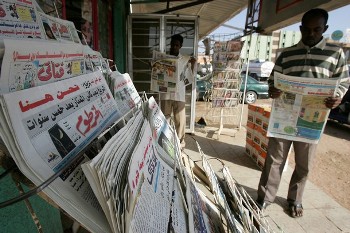Major rights organization slams draft press law as repressive
April 23, 2009 (NEW YORK) – The international rights group Human Rights Watch (HRW) said that Sudan’s draft bill on the press, which is before the national assembly, contains repressive measures and should undergo major changes. These concerns were shared by ARTICLE 19, a watchdog for freedom of expression whose office locations include London and Nairobi.

The proposed law, to be debated this week in parliament, is among 21 laws the National Congress Party and Sudan People’s Liberation Movement have agreed to revise ahead of elections now delayed until February 2010.
Despite that the draft revises the old law from 2004, HRW said nonetheless that “the current version retains many repressive provisions.”
These measures, which maintain the press under government control, include strict media registration rules, vague reporting prohibitions, a National Press Council controlled by the president with broad regulatory powers, and heavy fines and criminal sanctions for media outlets and journalists.
“The Press Council has powers to impose criminal sanctions for violations of the law, although an administrative and regulatory body should not carry such functions,” said ARTICLE 19.
ARTICLE 19 pointed additionally to restrictions imposed on the eligibility of chief editors, and rules subjecting journalists to licensing requirements.
“Revising the draft press act is a critical step in the law reform process,” said Georgette Gagnon, Africa director at Human Rights Watch. “The government’s pre-print censorship, harassment, and arrests of journalists, editors, and human rights activists are stifling free speech as Sudan faces crucial elections.”
Likewise, the British press watchdog called the changes introduced by the draft legislation “merely cosmetic,” alleging that they “fall short of amending the deficiencies of the current regime.”
Regular instances of restrictive control continue in the Sudan. In April, the government shut down printing runs of two newspapers, Ajras al-Hurriya, a daily paper that has been repeatedly censored, and Al-Midan, a news weekly trying to run opinion pieces on the draft press law.
“In view of the forthcoming 2010 national elections and the 2011 referendum in Sudan, restrictions against the media are likely to intensify unless the strict framework for regulation of the print media in Sudan is democratised,” observed ARTICLE 19.
(ST)
